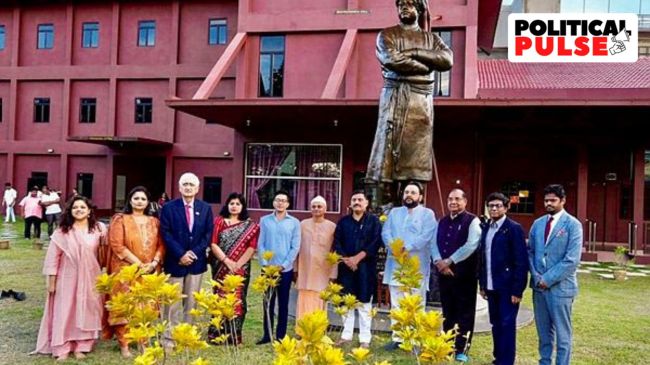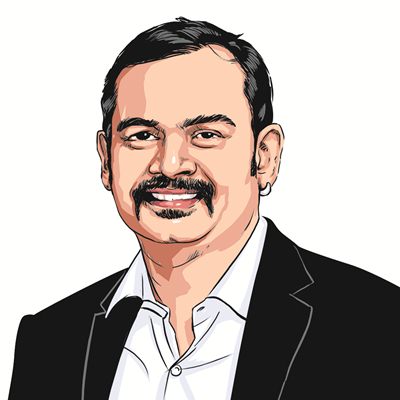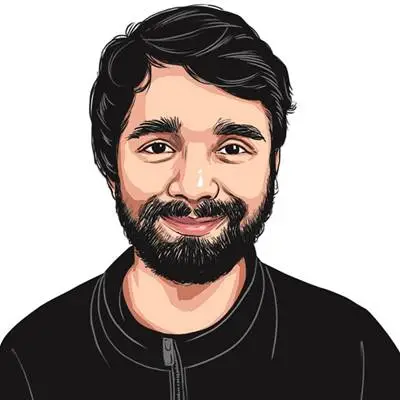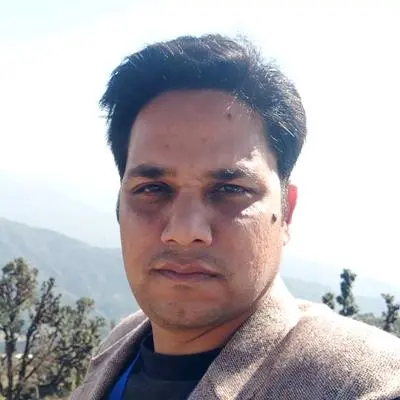Trump role to Kashmir status, Pak statement to ‘Western’ narrative: questions delegates fielded
Pak High Commission issued a statement in Kuala Lumpur against Delhi’s outreach
 An all-party delegation including including JD(U) MP Sanjay Jha, Congress leader and former external affairs minister Salman Khurshid, BJP MPs Aparajita Sarangi, Brij Lal, Pradan Baruah and Hemang Joshi, TMC MP Abhishek Banerjee, CPI(M) leader John Brittas and former ambassador Mohan Kumar with others in Petaling Jaya, Malaysia. (PTI Photo)
An all-party delegation including including JD(U) MP Sanjay Jha, Congress leader and former external affairs minister Salman Khurshid, BJP MPs Aparajita Sarangi, Brij Lal, Pradan Baruah and Hemang Joshi, TMC MP Abhishek Banerjee, CPI(M) leader John Brittas and former ambassador Mohan Kumar with others in Petaling Jaya, Malaysia. (PTI Photo) From addressing the “false equivalence” between Kashmir and Palestine and a “Western narrative” of both India and Pakistan “being responsible” for tensions between the two countries to answering questions on whether US President Donald Trump mediated peace and were tourists safe in India, the all-party delegations, which travelled to various foreign capitals, navigated many a question.
The Indian Express spoke to members who have returned and their refrain: the trip was a “success” as they were able to put across New Delhi’s position on terror emanating from Pakistan.
The most challenging outing was perhaps Malaysia. While the Indian delegation was in Kuala Lumpur, the Pakistan High Commission put out a statement, slamming the diplomatic move by India and asking countries in Southeast Asia and ASEAN to “remain vigilant”.
“It did not happen in any other country,” CPM’s John Brittas said. He was part of the delegation headed by JD(U) Rajya Sabha MP Sanjay Jha which visited Japan, South Korea, Indonesia, Malaysia and Singapore.
“In Indonesia and Malaysia we told country representatives that Pakistan keeps bringing resolutions against India in the Organisation of Islamic Cooperation (OIC) meetings. Since we are not part of the OIC, we told them to consider our point of view as well before entertaining such resolutions. Indonesia agreed. But Malaysia did not make any commitment. We also felt a tilt towards Pakistan in Malaysia,” said Jha.
Terming the interactions “productive” and “satisfactory”, Brittas said: “We felt there was a narrative which was not positive for India. There was a lot of misinformation prevalent. We had to put forward the views of the government of India. The biggest difficulty was that India and Pakistan were seen at par – what is called hyphenation of the countries. So, we had to even explain about the culture of India, which is pluralistic, diverse, democracy. The other side… We needed to separate the people of Pakistan from the government which is controlled by the Army. And the Army will need a conflict, which is what is happening there.”
There were questions on ceasefire, loss of war equipment. “We left the bit about equipment. But on ceasefire, we conveyed the stand of the government,” he said. One refrain was the narrative, Brittas said, that “India also has a responsibility” to what is happening between India and Pakistan and that issues between the two nations are not a “one-sided affair.”
“We were asked by some dignitaries about J&K and the stand of the people living there. We gave them information about the recent state Assembly elections, and how the people in Kashmir unitedly stood against the terror attack in Pahalgam – how India stood as one,” Brittas said, adding that “Opposition members part of the delegations fulfilled their responsibility, but now, it is time for the government to fulfil their responsibility”.
“Everyone condemned terrorism and supported the ceasefire. Many people suggested to us to involve China and other countries. But we asserted that it is a bilateral issue. Then there were questions about the actual role played by the US President in the ceasefire…and we told them clearly that ‘Trump is Trump and you know who is Trump. We can speak only about our country and we make our own decisions. We don’t get influenced and don’t get pressured by any third party,’” said Samajwadi Party MP Rajeev Rai, who was member of delegation led by DMK MP Kanimozhi Karunanidhi which visited Russia, Slovenia, Greece, Latvia and Spain.
Jha said the questions that the MPs were asked ranged from possibility of a nuclear conflict, ceasefire and concerns over tourism in India in the wake of the Pahalgam attack.
“On the ceasefire, they wanted to know US President Donald Trump’s role. We told them whenever conflict happens anywhere in the world, countries make phone calls. It does not mean they mediate peace. We told them that during the Russia-Ukraine conflict, even Prime Minister Narendra Modi spoke to leaders in both countries. It did not necessarily mean he was mediating… Our sense from the conversations was people had not taken Trump’s claims very seriously,” Jha said.
“We gave them evidence of how the first call for ceasefire was made by Pakistan. Indonesia and Malaysia had questions on whether tourism in India was safe. We told them India is a huge country and people were still coming in droves, even to Pahalgam. Country representatives also had questions on the Indus Water Treaty. We told them water and blood cannot flow together and that the preamble of the treaty mentioned ‘friendship and cooperation’ which was not there anymore,” Jha said.
Said Congress MP Manish Tewari, who was part of the delegation led by NCP (SP) MP Supriya Sule: “We were able to impress upon them that Pakistan is the epicentre of both terror and instability – not only in south Asia but across the world,” he said. His delegation visited Egypt, Qatar, Ethiopia, and South Africa.
“Perhaps, for the first time the story of Pakistan’s low intensity war against India, which has been going on for the past 45 years, was holistically told to our interlocutors. There is a false Pakistani narrative drawing an equivalence between Jammu and Kashmir and Palestine. That narrative was very effectively busted by us. That the depredations unleashed by Pakistan have nothing to do with J&K. It is because of the intervention in 1971 when India intervened in east Pakistan to prevent west Pakistani Army from perpetrating a genocide,” added Tewari.
most read
“We were successful in exposing Pakistan. All the delegates we met said that India has to take the lead in the fight against terrorism. We did what we were supposed to do,” said Muslim League MP E T Mohammed Basheer, who was part of the delegation that travelled to UAE, Liberia, Congo, and Sierra Leone.
Asked about the suggestions that the delegation received during discussions, Rai said some of the countries asked India to continue the ceasefire and hold talks with Pakistan.
“I intervened…told them that we take your suggestions but let us know with whom we should talk. In India there is a government, there is a Prime Minister, we have a civilian government but in Pakistan it is the other way around. The country controls the army in every country. But in Pakistan, the Army controls the country. And the civilian government there is a puppet government. The country you are suggesting to talk to, has become the biggest gang of terrorists,” he said.








